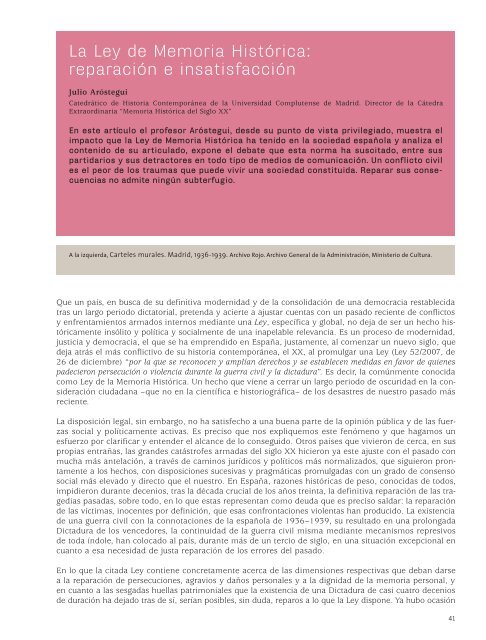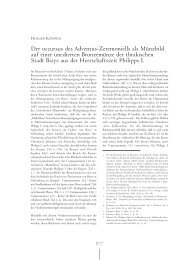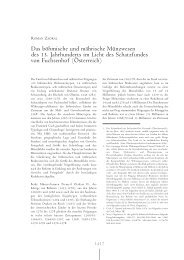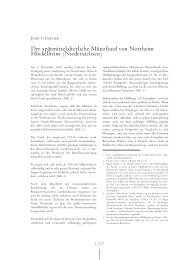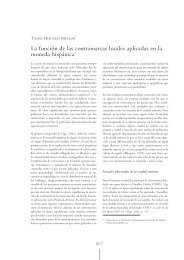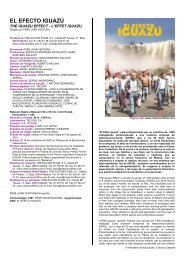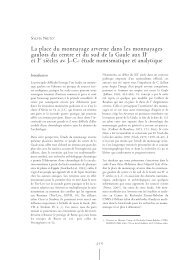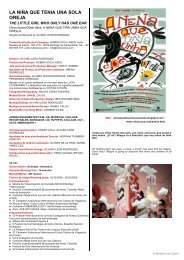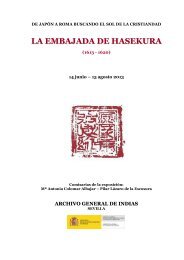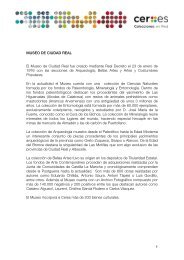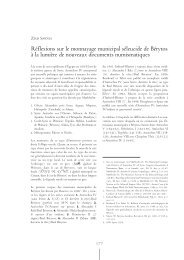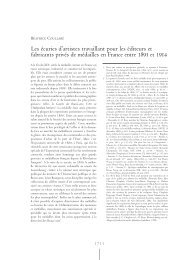La Ley de Memoria Histórica: reparación e insatisfacción Julio ...
La Ley de Memoria Histórica: reparación e insatisfacción Julio ...
La Ley de Memoria Histórica: reparación e insatisfacción Julio ...
You also want an ePaper? Increase the reach of your titles
YUMPU automatically turns print PDFs into web optimized ePapers that Google loves.
<strong>La</strong> <strong>Ley</strong> <strong>de</strong> <strong>Memoria</strong> <strong>Histórica</strong>:<br />
<strong>reparación</strong> e <strong>insatisfacción</strong><br />
<strong>Julio</strong> Aróstegui<br />
Catedrático <strong>de</strong> Historia Contemporánea <strong>de</strong> la Universidad Complutense <strong>de</strong> Madrid. Director <strong>de</strong> la Cátedra<br />
Extraordinaria “<strong>Memoria</strong> <strong>Histórica</strong> <strong>de</strong>l Siglo XX”<br />
En este artículo el profesor Aróstegui, <strong>de</strong>s<strong>de</strong> su punto <strong>de</strong> vista privilegiado, muestra el<br />
impacto que la <strong>Ley</strong> <strong>de</strong> <strong>Memoria</strong> <strong>Histórica</strong> ha tenido en la sociedad española y analiza el<br />
contenido <strong>de</strong> su articulado, expone el <strong>de</strong>bate que esta norma ha suscitado, entre sus<br />
partidarios y sus <strong>de</strong>tractores en todo tipo <strong>de</strong> medios <strong>de</strong> comunicación. Un conflicto civil<br />
es el peor <strong>de</strong> los traumas que pue<strong>de</strong> vivir una sociedad constituida. Reparar sus consecuencias<br />
no admite ningún subterfugio.<br />
A la izquierda, Carteles murales. Madrid, 1936-1939. Archivo Rojo. Archivo General <strong>de</strong> la Administración, Ministerio <strong>de</strong> Cultura.<br />
Que un país, en busca <strong>de</strong> su <strong>de</strong>finitiva mo<strong>de</strong>rnidad y <strong>de</strong> la consolidación <strong>de</strong> una <strong>de</strong>mocracia restablecida<br />
tras un largo periodo dictatorial, pretenda y acierte a ajustar cuentas con un pasado reciente <strong>de</strong> conflictos<br />
y enfrentamientos armados internos mediante una <strong>Ley</strong>, específica y global, no <strong>de</strong>ja <strong>de</strong> ser un hecho históricamente<br />
insólito y política y socialmente <strong>de</strong> una inapelable relevancia. Es un proceso <strong>de</strong> mo<strong>de</strong>rnidad,<br />
justicia y <strong>de</strong>mocracia, el que se ha emprendido en España, justamente, al comenzar un nuevo siglo, que<br />
<strong>de</strong>ja atrás el más conflictivo <strong>de</strong> su historia contemporánea, el XX, al promulgar una <strong>Ley</strong> (<strong>Ley</strong> 52/2007, <strong>de</strong><br />
26 <strong>de</strong> diciembre) “por la que se reconocen y amplían <strong>de</strong>rechos y se establecen medidas en favor <strong>de</strong> quienes<br />
pa<strong>de</strong>cieron persecución o violencia durante la guerra civil y la dictadura”. Es <strong>de</strong>cir, la comúnmente conocida<br />
como <strong>Ley</strong> <strong>de</strong> la <strong>Memoria</strong> <strong>Histórica</strong>. Un hecho que viene a cerrar un largo periodo <strong>de</strong> oscuridad en la consi<strong>de</strong>ración<br />
ciudadana –que no en la científica e historiográfica– <strong>de</strong> los <strong>de</strong>sastres <strong>de</strong> nuestro pasado más<br />
reciente.<br />
<strong>La</strong> disposición legal, sin embargo, no ha satisfecho a una buena parte <strong>de</strong> la opinión pública y <strong>de</strong> las fuerzas<br />
social y políticamente activas. Es preciso que nos expliquemos este fenómeno y que hagamos un<br />
esfuerzo por clarificar y enten<strong>de</strong>r el alcance <strong>de</strong> lo conseguido. Otros países que vivieron <strong>de</strong> cerca, en sus<br />
propias entrañas, las gran<strong>de</strong>s catástrofes armadas <strong>de</strong>l siglo XX hicieron ya este ajuste con el pasado con<br />
mucha más antelación, a través <strong>de</strong> caminos jurídicos y políticos más normalizados, que siguieron prontamente<br />
a los hechos, con disposiciones sucesivas y pragmáticas promulgadas con un grado <strong>de</strong> consenso<br />
social más elevado y directo que el nuestro. En España, razones históricas <strong>de</strong> peso, conocidas <strong>de</strong> todos,<br />
impidieron durante <strong>de</strong>cenios, tras la década crucial <strong>de</strong> los años treinta, la <strong>de</strong>finitiva <strong>reparación</strong> <strong>de</strong> las tragedias<br />
pasadas, sobre todo, en lo que estas representan como <strong>de</strong>uda que es preciso saldar: la <strong>reparación</strong><br />
<strong>de</strong> las víctimas, inocentes por <strong>de</strong>finición, que esas confrontaciones violentas han producido. <strong>La</strong> existencia<br />
<strong>de</strong> una guerra civil con la connotaciones <strong>de</strong> la española <strong>de</strong> 1936–1939, su resultado en una prolongada<br />
Dictadura <strong>de</strong> los vencedores, la continuidad <strong>de</strong> la guerra civil misma mediante mecanismos represivos<br />
<strong>de</strong> toda índole, han colocado al país, durante más <strong>de</strong> un tercio <strong>de</strong> siglo, en una situación excepcional en<br />
cuanto a esa necesidad <strong>de</strong> justa <strong>reparación</strong> <strong>de</strong> los errores <strong>de</strong>l pasado.<br />
En lo que la citada <strong>Ley</strong> contiene concretamente acerca <strong>de</strong> las dimensiones respectivas que <strong>de</strong>ban darse<br />
a la <strong>reparación</strong> <strong>de</strong> persecuciones, agravios y daños personales y a la dignidad <strong>de</strong> la memoria personal, y<br />
en cuanto a las sesgadas huellas patrimoniales que la existencia <strong>de</strong> una Dictadura <strong>de</strong> casi cuatro <strong>de</strong>cenios<br />
<strong>de</strong> duración ha <strong>de</strong>jado tras <strong>de</strong> sí, serían posibles, sin duda, reparos a lo que la <strong>Ley</strong> dispone. Ya hubo ocasión<br />
41
42<br />
Arriba, Cabalgada <strong>de</strong>l Niño. Valencia, 1936-1939. Archivo Rojo. Archivo General <strong>de</strong> la Administración, Ministerio <strong>de</strong> Cultura.
<strong>de</strong> ver formulados muchos <strong>de</strong> ellos en el propio trámite <strong>de</strong> p<strong>reparación</strong>, discusión y final aprobación <strong>de</strong><br />
esa disposición en las Cortes. Pero no son tales reparos nuestro objetivo aquí, sino la consi<strong>de</strong>ración <strong>de</strong><br />
las circunstancias que <strong>de</strong>s<strong>de</strong> el punto <strong>de</strong> vista histórico, memorial, moral y político han acompañado la<br />
andadura <strong>de</strong> una discutida disposición hoy en vigor. Una <strong>Ley</strong> <strong>de</strong> este género tiene, inevitablemente,<br />
zonas <strong>de</strong> confrontación con y entre realida<strong>de</strong>s ineludibles como son la Historia reciente <strong>de</strong>l país y las<br />
manifestaciones <strong>de</strong> la <strong>Memoria</strong> colectiva, siempre dispersas éstas últimas e, inevitablemente también,<br />
contradictorias. <strong>La</strong> <strong>reparación</strong> moral y memorial <strong>de</strong> las <strong>de</strong>rivaciones jurídicas e históricas <strong>de</strong> la represión<br />
dictatorial, así como sus transcripciones en el terreno penal –en la guerra y posguerra– enteramente<br />
enfrentadas a lo que prescribe el <strong>de</strong>recho <strong>de</strong> países <strong>de</strong>mocráticos, no es, <strong>de</strong>s<strong>de</strong> luego, un empeño fácil.<br />
En consecuencia, ninguna consi<strong>de</strong>ración sobre la <strong>Ley</strong> pue<strong>de</strong> hacerse olvidando el contexto in<strong>de</strong>fectiblemente<br />
“histórico” en que se toman las <strong>de</strong>cisiones que marcan la trayectoria <strong>de</strong> una sociedad, en el que<br />
se hacen las leyes. <strong>La</strong> ignorancia, culpable o inconsciente, <strong>de</strong> esa obligatoria contextualización histórica<br />
en la que muchas opiniones y posiciones han caído nos ha procurado hasta hoy no pocos dislates, privados<br />
y públicos, en el enjuiciamiento ajustado <strong>de</strong> lo que la disposición legal contiene.<br />
Puesto que se trata <strong>de</strong> enjuiciar una <strong>Ley</strong> en vigor, no serían ociosas unas breves consi<strong>de</strong>raciones sobre<br />
el proceso <strong>de</strong> su elaboración y aprobación tanto como un comentario sobre su contenido. Es bien sabido<br />
que la elaboración <strong>de</strong>l texto fue encomendada a una comisión ministerial, cuya actuación comenzó muy<br />
pronto en la legislatura <strong>de</strong> 2004, y que su redacción comenzó por la elaboración <strong>de</strong> un anteproyecto que,<br />
en <strong>de</strong>finitiva, experimentó alteraciones <strong>de</strong> cierta importancia antes <strong>de</strong> verse convertido en la <strong>Ley</strong> misma.<br />
Sustancialmente, el texto aprobado, que se dispone en veintidós artículos, ocho disposiciones adicionales,<br />
una <strong>de</strong>rogatoria y dos finales, a<strong>de</strong>más <strong>de</strong> un Preámbulo <strong>de</strong> gran interés, se dirige a la restitución <strong>de</strong> la<br />
memoria personal <strong>de</strong> víctimas inocentes y a la in<strong>de</strong>mnización, parcial y condicionada, <strong>de</strong> daños reconocidos<br />
en personas y patrimonios, así como a dar un <strong>de</strong>stino ajustado a las huellas materiales y simbólicas<br />
<strong>de</strong>l conflicto y <strong>de</strong>l periodo dictatorial.<br />
<strong>La</strong> <strong>Ley</strong>, pues, pue<strong>de</strong> consi<strong>de</strong>rarse que afecta a cuatro gran<strong>de</strong>s cuestiones relacionadas con la <strong>reparación</strong><br />
<strong>de</strong> las víctimas <strong>de</strong> un pasado traumático con bandos enfrentados que han tenido hasta finales <strong>de</strong>l siglo<br />
XX un tratamiento bastante disimétrico según hubiese sido, precisamente, el bando en que se militó. Es<br />
THE HISTORICAL MEMORY LAW: REPARITION AND<br />
DISSATISFACTION<br />
<strong>Julio</strong> Aróstegui<br />
Contemporary History Chairman of Complutense University<br />
of Madrid. Director of the Extraordinary Chair “Historical<br />
Memory of the 20th Century”<br />
That a country, searching for its <strong>de</strong>finitive mo<strong>de</strong>rnity<br />
and for the consolidation of a <strong>de</strong>mocracy<br />
reestablished after a long dictatorship, tries and<br />
manages to settle the score with a recent past of conflicts<br />
and internal armed battles through a specific and<br />
global, <strong>La</strong>w doesn’t cease to be an unusual historic event<br />
and politically and socially of unquestionable relevance.<br />
What has begun in Spain, at the very beginning of a new<br />
century, one which leaves behind the most conflictive<br />
century of its contemporary history, the 20th, is a process<br />
of mo<strong>de</strong>rnity, justice, and <strong>de</strong>mocracy, in passing a <strong>La</strong>w<br />
(<strong>Ley</strong> 52/2007, of December 26) “by which the rights are<br />
recognized and augmented and measures established in<br />
favor of those who suffered persecution or violence during<br />
the Civil War and the Dictatorship”. That is to say,<br />
what is commonly known as the Historical Memory <strong>La</strong>w.<br />
An act which closes a long dark period in the civil<br />
(though not in the scientific or historiographic) consi<strong>de</strong>ration<br />
of the disasters of our most recent past.<br />
Nonetheless, this legal disposition has not satisfied a<br />
large sector of the public opinion nor of the social and<br />
politically active forces. It is necessary that we explain<br />
this phenomenon and that we make an effort to clarify<br />
and un<strong>de</strong>rstand the reach of what has been achieved.<br />
Other countries which lived firsthand, with their own viscera,<br />
the great armed catastrophes of the 20th Century,<br />
already ma<strong>de</strong> this reconciliation with the past much<br />
sooner, through more normal judiciary and political<br />
channels which followed quickly on the heels of the acts<br />
themselves: successive and pragmatic dispositions<br />
passed with a higher and more-direct <strong>de</strong>gree of social<br />
consensus than our own. In Spain, well-known weighty<br />
historic reasons impe<strong>de</strong>d during <strong>de</strong>ca<strong>de</strong>s (after that crucial<br />
<strong>de</strong>ca<strong>de</strong> of the 1930s) the <strong>de</strong>finitive reparation of the<br />
past tragedies, above all, in what these represented as a<br />
<strong>de</strong>bt needing to be repaid: the reparation of the victims,<br />
innocent by <strong>de</strong>finition, which these violent confrontations<br />
have produced. The existence of a civil war with the connotations<br />
of the Spanish one of 1936-1939, its result in a prolonged<br />
Dictatorship by the victors, the continuation of the<br />
same Civil War through repressive mechanisms of every<br />
sort, have placed the country, for over a third of a century,<br />
in an exceptional situation in terms of this need for a just<br />
reparation of the mistakes of the past.<br />
In terms of what the cited <strong>La</strong>w contains specifically<br />
about the respective dimensions of the reparation to be<br />
43
<strong>de</strong>cir –conviene insistir una vez más en ello–, las víctimas <strong>de</strong> la parte vencedora fueron reparadas <strong>de</strong><br />
inmediato, mientras el bando vencido era reprimido o estaba en el exilio. Un primer bloque, en el que<br />
podría incluirse también el propio Preámbulo <strong>de</strong> la disposición, se ocupa <strong>de</strong> sentar, digámoslo así, una<br />
doctrina <strong>de</strong> la <strong>reparación</strong>. Se trata <strong>de</strong> sus cuatro primeros artículos, <strong>de</strong> los que el 4º aborda el tema <strong>de</strong><br />
la “<strong>de</strong>claración <strong>de</strong> <strong>reparación</strong> y reconocimiento personal”, objeto <strong>de</strong> bastante discusión previa en la búsqueda<br />
<strong>de</strong>l mecanismo mediante el que este reconocimiento <strong>de</strong>bía ser expresado. Un segundo conjunto <strong>de</strong><br />
ellos se ocupa <strong>de</strong>l tipo <strong>de</strong> reparaciones personales que se establecen. Así, se habla <strong>de</strong> in<strong>de</strong>mnizaciones y<br />
ayudas, <strong>de</strong> ampliación <strong>de</strong> anteriores ya aprobadas, con la particularidad <strong>de</strong> que las víctimas <strong>de</strong> conflictos<br />
pasados se amplían hasta incluir entre ellas las <strong>de</strong>rivadas <strong>de</strong> procesos muy posteriores a la guerra civil<br />
como son las víctimas fallecidas en “la <strong>de</strong>fensa <strong>de</strong> la <strong>de</strong>mocracia” entre 1968 y 1977, o sea, las que lo<br />
fueron en el periodo álgido <strong>de</strong>l fin <strong>de</strong>l régimen dictatorial y el proceso <strong>de</strong> la Transición, que lo fueron por<br />
acciones represivas estatales o por causa <strong>de</strong> acciones terroristas dirigidas a <strong>de</strong>tener el proceso <strong>de</strong> cambio<br />
<strong>de</strong>mocrático.<br />
En tercer lugar, se incluyen una serie <strong>de</strong> disposiciones dirigidas a la recuperación <strong>de</strong> los cuerpos <strong>de</strong> víctimas<br />
que fueron inhumadas en fosas comunes, en lugares no dispuestos ni prescritos para tales inhumaciones,<br />
con ausencia absoluta <strong>de</strong> legalidad y <strong>de</strong> la más mínima consi<strong>de</strong>ración <strong>de</strong> los <strong>de</strong>rechos <strong>de</strong> las<br />
personas. <strong>La</strong> guerra civil abunda en hechos <strong>de</strong> este tipo que se dieron en el territorio <strong>de</strong> ambos contendientes.<br />
Se <strong>de</strong>spliegan, por último, otra serie <strong>de</strong> disposiciones <strong>de</strong> carácter memorial también pero con<br />
mayor contenido instrumental. <strong>La</strong> eliminación <strong>de</strong> símbolos materiales y monumentos conmemorativos<br />
<strong>de</strong> la “victoria” o <strong>de</strong> la Dictadura y <strong>de</strong> exaltación <strong>de</strong> uno <strong>de</strong> los bandos en la guerra civil. Sin embargo,<br />
la <strong>Ley</strong> sólo tiene carácter imperativo en este sentido para el Patrimonio <strong>de</strong>l Estado, no para el <strong>de</strong> otras<br />
instituciones. Se incluyen, por fin, disposiciones ten<strong>de</strong>ntes a que toda la información acerca <strong>de</strong> estos<br />
hechos históricos se haga accesible a todos los ciudadanos sin trabas <strong>de</strong> ninguna especie. Se abordan<br />
ahí, por tanto, disposiciones sobre la disponibilidad y mantenimiento <strong>de</strong> los archivos, el <strong>de</strong>recho a la<br />
información, el reconocimiento <strong>de</strong> asociaciones memoriales y la creación <strong>de</strong> un Centro Documental <strong>de</strong><br />
la <strong>Memoria</strong>, entre otras cosas.<br />
given for the persecutions, offences, and personal damages<br />
and to the dignity of the personal memory, and in<br />
terms of the inclined patrimonial tracks that the existence<br />
of a Dictatorship of almost four centuries in duration<br />
have left behind, without a doubt objections to what<br />
the <strong>La</strong>w offers would be possible. There was already occasion<br />
to see many of them formulated in the act of preparation,<br />
discussion, and final approval of this disposition in<br />
the Court. But those objections are not our objective<br />
here, but rather the consi<strong>de</strong>ration of the circumstances<br />
which from an historic, memorial, moral, and political<br />
point of view have accompanied the passage of a disputed<br />
disposition now in effect. A <strong>La</strong>w of this sort has,<br />
inevitable, areas of confrontation with and between<br />
inescapable realities such as the recent History of the<br />
country and the manifestations of the Collective Memory,<br />
which are always disperse and, also inevitably, contradictory.<br />
The moral and memorial reparation of the judicial<br />
and historic <strong>de</strong>rivations of the Dictatorial repression, as<br />
well as its transcriptions in the penal realm–in the war<br />
and the postwar–eternally at loggerheads with what the<br />
rights of <strong>de</strong>mocratic countries offer, are not, needless to<br />
say, an easy task. As a consequence, no consi<strong>de</strong>ration<br />
about the <strong>La</strong>w can be ma<strong>de</strong> forgetting the in<strong>de</strong>fectibly<br />
“historic” context in which the <strong>de</strong>cisions which mark the<br />
trajectory of a society were <strong>de</strong>liberated, in which the laws<br />
were ma<strong>de</strong>. Ignorance, guilty or unconscious, of this<br />
obligatory historic contextualization in which many opin-<br />
44<br />
A la <strong>de</strong>recha, arriba, Batallón <strong>de</strong> choque. Madrid, 1936-1939. Abajo, Cerro Rojo. Prisioneros absueltos. Madrid, 1936-1939.<br />
Archivo Rojo. Archivo General <strong>de</strong> la Administración, Ministerio <strong>de</strong> Cultura.<br />
ions and positions have fallen has brought us more than<br />
a few public and private absurdities until now, in the<br />
proper judgment of what the legal disposition contains.<br />
Given that this concerns judging a <strong>La</strong>w that is in effect, a<br />
few brief consi<strong>de</strong>ration about the process of its elaboration<br />
and approval as well as a commentary about its contents<br />
would not be frivolous. It is well known that the<br />
elaboration of the text was commissioned of a ministerial<br />
commission, whose actuation began very early in the<br />
legislature of 2004, and that its creation began by the<br />
elaboration of a draft that unquestionably suffered alterations<br />
of some import before seeing itself converted into<br />
the <strong>La</strong>w itself. Substantially, the approved text (which<br />
boasts twenty two articles, eight additional dispositions,<br />
a <strong>de</strong>rogatory and two conclusions, in addition to a<br />
Preamble of great interest) is directed to the restitution<br />
of the personal memory of innocent victims and to the<br />
partial and conditional in<strong>de</strong>mnification of recognized<br />
damages to people and property, as well as to give a just<br />
<strong>de</strong>stiny to the material and symbolic traces of the conflict<br />
and of the Dictatorship.<br />
The <strong>La</strong>w, then, can be consi<strong>de</strong>red to affect four large<br />
questions relating to the reparation of the victims of a<br />
traumatic past with clashing si<strong>de</strong>s that have had a rather<br />
dissimilar treatment until the end of the 20th Century,<br />
precisely because of which si<strong>de</strong> they fought on. That is to
46<br />
Arriba, Transmisiones. Madrid, 1936-1939. Abajo, Schellkorn, Walter. Aviador alemán prisionero. Madrid, 1936-1939.<br />
Archivo Rojo. Archivo General <strong>de</strong> la Administración, Ministerio <strong>de</strong> Cultura.
<strong>La</strong> <strong>Ley</strong>, <strong>de</strong> estimable carácter comprehensivo y con disposiciones en las que hay un tratamiento aceptablemente<br />
compensado <strong>de</strong> la memoria <strong>de</strong> las víctimas con in<strong>de</strong>pen<strong>de</strong>ncia <strong>de</strong> su i<strong>de</strong>ología y <strong>de</strong>l bando en<br />
que militaron, ha levantado, sin embargo, <strong>de</strong>s<strong>de</strong> que se conoció su proyecto, porfiadas oposiciones,<br />
resistencias a su contenido completo o a algunas <strong>de</strong> sus disposiciones, ha levantado acusaciones lejos <strong>de</strong><br />
cualquier pon<strong>de</strong>rada consi<strong>de</strong>ración <strong>de</strong>l asunto. ¿Cuáles han sido esas resistencias, <strong>de</strong> dón<strong>de</strong> han procedido<br />
y cómo han intentado argumentarse?<br />
Existe una creencia no justificada pero bastante generalizada <strong>de</strong> que la oposición se enmarca únicamente<br />
en una u otra <strong>de</strong> dos posturas que vendrían a coincidir con la herencia histórica y memorial <strong>de</strong> los dos<br />
bandos a los que, con cierta simplificación también, se atribuye el origen <strong>de</strong> los gran<strong>de</strong>s enfrentamientos<br />
españoles <strong>de</strong>l siglo XX que tienen, como es sabido, su punto <strong>de</strong> partida en el periodo republicano <strong>de</strong> los<br />
años treinta <strong>de</strong>l siglo XX, que culminan en una guerra civil y que tuvieron como consecuencia más dura<strong>de</strong>ra<br />
casi cuarenta años <strong>de</strong> Dictadura sustentada por el bando vencedor en la guerra civil, o sea, aquel<br />
que se sublevó contra la legitimidad <strong>de</strong> la República existente entre 1931 y 1936. Más <strong>de</strong> dos tercios <strong>de</strong><br />
siglo <strong>de</strong>spués, la relevancia histórica y memorial <strong>de</strong> aquel periodo <strong>de</strong> nuestra Historia, <strong>de</strong>l que apenas<br />
quedan testigos vivos, sigue teniendo una virtualidad que no es preciso <strong>de</strong>stacar. Cabría preguntarse,<br />
pues, y esa sería la pregunta más pertinente cuando se aborda un conflicto como éste, por las razones<br />
<strong>de</strong> su persistencia en la <strong>Memoria</strong>. Una respuesta a esta pregunta sería mucho más clarificadora que<br />
muchas resistencias <strong>de</strong> oscuro origen…<br />
En <strong>de</strong>finitiva, una <strong>de</strong> esas oposiciones está representada por quienes mantienen que transcurridos setenta<br />
años <strong>de</strong>s<strong>de</strong> la contienda central y más <strong>de</strong> treinta <strong>de</strong>s<strong>de</strong> el final <strong>de</strong> la Dictadura, la <strong>Ley</strong> no hace sino reabrir<br />
una memoria traumática, y un conflicto histórico que se supone, a<strong>de</strong>más, que el carácter y las disposiciones<br />
concretas <strong>de</strong> la época <strong>de</strong> tránsito a la <strong>de</strong>mocracia constitucional en los años setenta <strong>de</strong>jó sustancialmente<br />
reparados. <strong>La</strong> reconciliación <strong>de</strong> los españoles, el olvido <strong>de</strong> las tragedias, la amnistía para los<br />
culpables <strong>de</strong> ellas, habrían marcado, entre los años 1975 y 1982, aproximadamente, el momento <strong>de</strong> una<br />
nueva historia y una nueva consi<strong>de</strong>ración memorial, la <strong>de</strong> la superación <strong>de</strong>l conflicto, el reconocimiento<br />
<strong>de</strong>l error colectivo y el propósito, colectivo también, <strong>de</strong> su no reproducción. Normalmente, esta posición<br />
tan confortable es mantenida por sectores sociológicos e i<strong>de</strong>ológicos <strong>de</strong> la población española que, incluso<br />
say (it bears repeating once again), the victims of the victorious<br />
si<strong>de</strong> were immediately recompensed, while the<br />
vanquished si<strong>de</strong> were repressed or were in exile. A first<br />
section, in which the very Preamble of the disposition<br />
could also be inclu<strong>de</strong>d, concerns itself of setting a doctrine<br />
of the reparation. This takes up the <strong>La</strong>w’s first four<br />
articles, of which the 4th treats the theme of the “<strong>de</strong>claration<br />
of personal reparation and recognition”, object of<br />
much previous discussion in the search of the mechanism<br />
by which this recognition should be expressed. A<br />
second group concerns the type of personal reparations<br />
that are established. Thus, it speaks of in<strong>de</strong>mnifications<br />
and assistances, of augmenting those previous already<br />
approved, in particular that the <strong>de</strong>finition of victim of<br />
past conflicts be expan<strong>de</strong>d to inclu<strong>de</strong> those who were<br />
victims from later processes after the Civil War such as<br />
the victims killed in the “<strong>de</strong>fense of the <strong>de</strong>mocracy”<br />
between 1968 and 1977; in other words, those who were<br />
victims in the critical period at the end of the dictatorial<br />
regime and the process of the Transition, who were victims<br />
because of repressive actions of the state or<br />
through terrorist activities directed at stopping the<br />
process of <strong>de</strong>mocratic change.<br />
In the third place, the <strong>La</strong>w inclu<strong>de</strong>s a series of dispositions<br />
directed at the recovery of the bodies of victims<br />
which were interred in mass graves, in places neither<br />
ready nor prescribed for such burials, with full absence of<br />
legality and lack the most minimal consi<strong>de</strong>ration of the<br />
rights of the people. The Civil War is full of acts of this<br />
type which took place in the territory of both factions.<br />
Finally, another series of dispositions, also memorial in<br />
nature but with greater instrumental content, are unfol<strong>de</strong>d.<br />
The elimination of the material symbols and commemorative<br />
monuments of the “victory” or of the<br />
Dictatorship and of the exaltation of any of the factions<br />
in the Civil War. Nonetheless, the <strong>La</strong>w only has an imperative<br />
nature in this sense for the Heritage of the State,<br />
not for that of other institutions. Finally, dispositions so<br />
that all information about these historic occurrences are<br />
ma<strong>de</strong> accessible to all the citizens without barriers of<br />
any sort are inclu<strong>de</strong>d. These therefore concern dispositions<br />
about the availability and maintenance of archives,<br />
the right to the information, the recognition of memorial<br />
associations, and the creation of a Documentary Center<br />
of the Memory, among other things.<br />
The <strong>La</strong>w, of consi<strong>de</strong>rably comprehensive nature and with<br />
dispositions in which there is an acceptably compensated<br />
treatment of the memory of the victims in<strong>de</strong>pen<strong>de</strong>nt<br />
of their i<strong>de</strong>ology and of the faction for which they<br />
fought, has nonetheless awoken, since the project was<br />
ma<strong>de</strong> known, obstinate opposition: resistance to its full<br />
content or to some of its dispositions, it has raised accusations<br />
far from any thoughtful consi<strong>de</strong>ration of the<br />
matter. What have these resistances been, where do<br />
47
econociendo en muchos casos la ilegitimidad <strong>de</strong>l levantamiento armado que provocó una guerra civil,<br />
no <strong>de</strong>jan <strong>de</strong> encontrar éste explicable y, lo que es más <strong>de</strong>terminante, justificable. Esa opinión tiene su<br />
asiento más notable en la <strong>de</strong>recha política, a cuyo frente se encuentra el Partido Popular, y cuenta con el<br />
apoyo <strong>de</strong> la jerarquía eclesiástica en bloque, parte <strong>de</strong> la magistratura y algunos sectores más minoritarios.<br />
En la otra parte, la posición genérica <strong>de</strong> la i<strong>de</strong>ología <strong>de</strong> izquierda española y <strong>de</strong> algún grupo nacionalista,<br />
como es el caso <strong>de</strong> Esquerra Republicana <strong>de</strong> Cataluña, mostró también inequívocamente su oposición a<br />
un texto legal que tal como se presentaba no satisfacía sus aspiraciones a una <strong>reparación</strong> completa <strong>de</strong><br />
la memoria <strong>de</strong> los vencidos. Des<strong>de</strong> este ámbito surgieron incluso documentos como el “Manifiesto <strong>de</strong><br />
Barcelona”, <strong>de</strong> noviembre <strong>de</strong> 2006, en el que un amplio conjunto <strong>de</strong> instituciones <strong>de</strong> diverso tipo pedían<br />
la tajante retirada <strong>de</strong>l proyecto auspiciado por el Gobierno. Y es que esta posición se movía sobre el eje<br />
<strong>de</strong> la exigencia <strong>de</strong> una <strong>de</strong>claración explícita <strong>de</strong> nulidad <strong>de</strong> todos los procesos y las correspondientes sentencias<br />
dictadas por los Tribunales Civiles y militares que los sublevados erigieron y la Dictadura mantuvo<br />
durante dos <strong>de</strong>cenios para juzgar los supuestos <strong>de</strong>litos políticos cometidos por quienes <strong>de</strong>fendieron la<br />
legalidad republicana. <strong>La</strong> posición genérica <strong>de</strong> las izquierdas es, pues, la <strong>de</strong> que el documento puesto en<br />
marcha era claramente insuficiente como instrumento reparador y no cumplía sus propósitos.<br />
Aún así, estas dos posiciones realmente inconciliables no recogen en su totalidad el espectro <strong>de</strong> las disconformida<strong>de</strong>s,<br />
totales o parciales, que se manifestaron ante la posibilidad <strong>de</strong> la promulgación <strong>de</strong> una<br />
<strong>Ley</strong> <strong>de</strong> este tipo. Hubo una importante corriente <strong>de</strong> opinión ciudadana, tanto como <strong>de</strong> expertos y eruditos,<br />
que, tiene que ser reconociendo en principio la necesidad <strong>de</strong> una acción reparadora <strong>de</strong>finitiva, divergía<br />
en las formas <strong>de</strong> su expresión y en los instrumentos aplicables para ello. <strong>La</strong> <strong>de</strong>claración <strong>de</strong> nulidad <strong>de</strong><br />
Tribunales y sentencias obra <strong>de</strong> los sublevados y la Dictadura dividió por lo pronto a los juristas, ciertamente<br />
según la línea que separa a conservadores y progresistas. <strong>La</strong>s formas concretas en que la <strong>Memoria</strong><br />
Colectiva –mejor “las memorias”– <strong>de</strong>bía hacerse cargo <strong>de</strong> esta necesidad socialmente inaplazable y proce<strong>de</strong>r<br />
a las rectificaciones <strong>de</strong>bidas son también fuente <strong>de</strong> criterios encontrados. Pero es que, por <strong>de</strong>más,<br />
la necesidad y la posibilidad <strong>de</strong> que la <strong>Memoria</strong> misma pudiese ser fundamentada y rectificada precisamente<br />
con una disposición con rango <strong>de</strong> <strong>Ley</strong> dividió a políticos, intelectuales, magistrados y medios <strong>de</strong><br />
48<br />
A la <strong>de</strong>recha, arriba, Hogares <strong>de</strong>struidos. Madrid, 1936-1939. Abajo, Refugios abiertos en las calles contra la aviación facciosa.<br />
Madrid, 1936-1939. Archivo Rojo. Archivo General <strong>de</strong> la Administración, Ministerio <strong>de</strong> Cultura.<br />
they come from, and how have they tried to present<br />
themselves?<br />
There exists an unjustified but fairly generalized belief<br />
that the opposition is framed only in one or another of<br />
two postures which would come to coinci<strong>de</strong> with the<br />
historic and memorial heritage of the two factions to<br />
which, with certain simplification as well, the origin of<br />
the great Spanish confrontations of the 20th Century is<br />
also attributed, which have, as is known, their nascence<br />
in the Republican period of the 1930s, which culminated<br />
in a Civil War and which had as a more enduring consequence<br />
almost forty years of a Dictatorship maintained<br />
by the victorious si<strong>de</strong> of the Civil War, that is, those who<br />
rebelled against the legitimacy of the Republic existing<br />
between 1931 and 1936. More than two thirds of a century<br />
later, the historic and memorial relevance of that period<br />
of our History, of which scant living witnesses remain,<br />
continues to have a potency that needs no highlighting.<br />
It bears asking ourselves, therefore, and this would be<br />
the most relevant question when one approaches a conflict<br />
such as this, for the reasons behind its persistence<br />
in the Memory. An answer to this question would be<br />
much more clarifying than many resistances of obscure<br />
origin...<br />
Definitively, one of these oppositions is represented by<br />
those who maintain that seventy years after the central<br />
conflict and more than thirty since the end of the<br />
Dictatorship, the <strong>La</strong>w does nothing but reopen a traumatic<br />
memory, and a historic conflict where it is supposed,<br />
moreover, that the character and the specific dispositions<br />
of the transitional period to the constitutional<br />
<strong>de</strong>mocracy in the 1970s were left substantially compensated.<br />
The reconciliation of the Spanish, the forgetting of<br />
the tragedies, the amnesties for those guilty of them,<br />
have marked, between the years 1975 and 1982 approximately,<br />
the moment of a new history and a new memorial<br />
consi<strong>de</strong>ration: that of overcoming the conflict, the<br />
recognition of the collective error and the proposal, also<br />
collective, of its not being repeated. Normally, this socomfortable<br />
position is maintained by sociological and<br />
i<strong>de</strong>ological sectors of the Spanish population which, even<br />
recognizing in many cases the illegitimacy of the armed<br />
uprising which provoked a Civil War don’t cease to find<br />
this explainable and, what is even more crucial, justifiable.<br />
This opinion has its most notable seat in the political<br />
right, at whose forefront one finds the Partido Popular, and<br />
has the support of the full ecclesiastical hierarchy, part of<br />
the judicature, and some more minority sectors.<br />
On the other si<strong>de</strong>, the generic position of the i<strong>de</strong>ology of<br />
the Spanish left and of some nationalist groups, such as<br />
the case of Esquerra Republicana <strong>de</strong> Cataluña, also<br />
unquestionably show their opposition to a legal text<br />
which as it is presented doesn’t satisfy their aspirations
50<br />
Arriba, Avenida Pi y Margall. Cola <strong>de</strong> tabaco. Madrid, 1936-1939. Archivo Rojo. Archivo General <strong>de</strong> la Administración, Ministerio <strong>de</strong><br />
Cultura.
comunicación, al mundo académico relacionado con la Historia y las ciencias sociales y a colectivos ciudadanos<br />
interesados y activos. Y en este terreno está muy presente la aprensión <strong>de</strong> que los “movimientos<br />
por la memoria” interfieran y dificulten la tarea <strong>de</strong> elaborar una Historia verda<strong>de</strong>ramente profesional,<br />
informada, veraz e in<strong>de</strong>pendiente, <strong>de</strong> nuestros recientes conflictos. Y esa aprensión es perfectamente<br />
explicable.<br />
Al fin, tras un recorrido proceloso en muchos aspectos, la <strong>Ley</strong> 52/2007, <strong>de</strong> 26 <strong>de</strong> diciembre, ha expresado<br />
en un texto <strong>de</strong> alto rango un difícil equilibrio <strong>de</strong> propuestas <strong>de</strong> fondo y medios instrumentales para una<br />
<strong>reparación</strong>, que nadie honradamente pue<strong>de</strong> discutir pero que la realidad muestra que ha producido grados<br />
y formas <strong>de</strong> la <strong>insatisfacción</strong> que permanecen en pie. <strong>La</strong>s <strong>de</strong>rechas sociológicas y políticas españolas, e<br />
instituciones como la Iglesia Católica, han mantenido su oposición frontal. Los sectores progresistas, un<br />
amplio espectro <strong>de</strong> las personas afectadas familiar e i<strong>de</strong>ológicamente por el contenido <strong>de</strong> la <strong>Ley</strong>, han<br />
mantenido igualmente sus reticencias.<br />
Cabe ahora, pues, expuestos estos extremos, intentar expresar unos comentarios y unas explicaciones<br />
acerca <strong>de</strong> la justicia o no <strong>de</strong> esa <strong>insatisfacción</strong>, <strong>de</strong>l alcance mismo <strong>de</strong> la <strong>Ley</strong> y <strong>de</strong> lo que pue<strong>de</strong> esperarse<br />
<strong>de</strong> sus objetivos y los medios puestos en acción para conseguirlos. Y cabe expresar una impresión primera<br />
en cuanto a las perspectivas que la disposición plantea y las posibilida<strong>de</strong>s <strong>de</strong> su cumplimiento. <strong>La</strong><br />
“<strong>Ley</strong> <strong>de</strong> <strong>Memoria</strong> <strong>Histórica</strong>” es una disposición tardía, sin duda, incompleta en ciertos aspectos, tal vez<br />
utópica en otros, pero que aborda con entera justicia la satisfacción <strong>de</strong> una <strong>de</strong>uda colectiva que nunca<br />
fue encarada con la generalidad con la que lo es ahora.<br />
<strong>La</strong> <strong>Ley</strong> ha sido promulgada en un momento histórico, al comenzar el nuevo siglo, cuyas características<br />
explican suficientemente su propia aparición. Así, si bien su Preámbulo, <strong>de</strong> gran interés, se reclama <strong>de</strong>l<br />
espíritu reconciliador <strong>de</strong> la Transición a la <strong>de</strong>mocracia como inspiración y fundamento <strong>de</strong> sus disposiciones,<br />
no es menos cierto que su contenido y el momento en que aparece nos muestran, más bien, que<br />
las carencias <strong>de</strong>nunciadas se relacionan por todos los críticos con la forma en que los protagonistas <strong>de</strong><br />
esa Transición abordaron la re-consi<strong>de</strong>ración <strong>de</strong>l pasado que había llevado a una larga Dictadura tras una<br />
guerra civil producto <strong>de</strong> un alzamiento ilegítimo, como ha sido reconocido por una <strong>de</strong>claración parlamentaria<br />
<strong>de</strong> 2002.<br />
of a full reparation of the memory of the <strong>de</strong>feated. From<br />
this realm has even arisen documents such as the<br />
“Barcelona Manifesto” from November 2006, in which a<br />
broad spectrum of institutions of different sorts asked<br />
for the categorical removal of the project sponsored by<br />
the Government. This position moves on the axis of the<br />
<strong>de</strong>mand for an explicit <strong>de</strong>claration of invalidity of all the<br />
processes and the corresponding sentences dictated by<br />
the civil and military courts that the rebels erected and<br />
which the Dictatorship maintained during two <strong>de</strong>ca<strong>de</strong>s<br />
to judge the supposed political crimes committed by<br />
those who <strong>de</strong>fen<strong>de</strong>d the Republican legality. The generic<br />
position of the left is, therefore, that the document set<br />
into motion is clearly insufficient as a reparative instrument<br />
and didn’t fulfill its intentions.<br />
Even so, these two truly irreconcilable positions don’t<br />
make up the sum total of the spectrum of total or partial<br />
disagreements that were expressed in reaction to<br />
the possibility of the passage of a <strong>La</strong>w of this type. There<br />
was an important current of civic opinion, as well as<br />
from experts and scholars, who, recognizing in principle<br />
the need of a <strong>de</strong>finitive reparatory action, were split in<br />
the forms of its expressions and the applicable instruments<br />
to un<strong>de</strong>rtake it. The <strong>de</strong>claration of invalidity of<br />
the Courts and sentences ma<strong>de</strong> by the rebels and the<br />
Dictatorship divi<strong>de</strong>d the judges, certainly along the line<br />
that separates conservatives and progressives. The spe-<br />
cific forms in which the Collective Memory (or better yet,<br />
“the memories”) should take charge of this socially<br />
urgent need and to proceed to the due rectifications is<br />
also the source of found criteria. But it is that, for the<br />
rest, the need and the possibility that the Memory itself<br />
could be based and rectified precisely with a disposition<br />
with the range of a <strong>La</strong>w divi<strong>de</strong>d politicians, intellectuals,<br />
magistrates and the media, to the aca<strong>de</strong>mic world related<br />
to History and the social sciences and the active and<br />
implicated civic collectives. And in this field, the apprehension<br />
that the “movements for the memory” interfere<br />
and make difficult the work of elaborating a truly professional,<br />
informed, faithful, and in<strong>de</strong>pen<strong>de</strong>nt History of<br />
our recent conflicts is very present. And this apprehension<br />
is perfectly explainable.<br />
After a stormy journey in many aspects, <strong>La</strong>w 52/2007 of<br />
December 26, has finally expressed in a text of wi<strong>de</strong><br />
scope a difficult equilibrium of fundamental proposals<br />
and instrumental media for a reparation which no one<br />
honorably could dispute but which reality shows has produced<br />
<strong>de</strong>grees and forms of dissatisfaction which remain<br />
active. The Spanish sociological and political right, institutions<br />
such as the Catholic Church, have maintained<br />
their head-on opposition. The progressive sectors, a wi<strong>de</strong><br />
spectrum of the people affected through family and i<strong>de</strong>ologically<br />
by the contents of the <strong>La</strong>w, have likewise maintained<br />
their reticence.<br />
51
52<br />
Arriba, Muchachas trabajando. Madrid, 1936-1939. Abajo, muchachas stajanovistas. Madrid, 1936-1939. A la <strong>de</strong>recha,<br />
Reparando líneas telefónicas. Madrid, 1936-1939. Archivo Rojo. Archivo General <strong>de</strong> la Administración, Ministerio <strong>de</strong> Cultura.
<strong>La</strong> <strong>Ley</strong>, en su fondo, respon<strong>de</strong> al espíritu <strong>de</strong> una nueva generación, la que con propiedad ha sido llamada<br />
más <strong>de</strong> una vez <strong>de</strong> “los nietos <strong>de</strong> la guerra”, que no vivieron ésta pero que guardan <strong>de</strong> ella una “memoria<br />
heredada” y que tampoco participaron <strong>de</strong> forma activa en el proceso <strong>de</strong> la Transición. Este asunto no<br />
pue<strong>de</strong> ser, en forma alguna, minusvalorado y da, por lo <strong>de</strong>más, al texto legal su más significativa dimensión.<br />
El espíritu <strong>de</strong> la reconciliación <strong>de</strong>jó, ciertamente, muchos frentes abiertos, en especial en el terreno<br />
moral. <strong>La</strong> <strong>Ley</strong>, en todo caso, se presenta con ese espíritu reconciliador, <strong>de</strong> <strong>reparación</strong>, <strong>de</strong> reconocimiento<br />
<strong>de</strong> injusticias. Se equivocan lamentablemente, a nuestro juicio, quienes mantienen que su propósito es<br />
revanchista o parcial y, sobre todo, que viene a “reabrir” viejas heridas ya sanadas. No hay viejas heridas<br />
sanadas, porque no las ha cerrado nunca la justicia y, en ese sentido, la <strong>Ley</strong> no pue<strong>de</strong> reabrir nada que<br />
ya estuviese cerrado. No es inocente que quienes más cerradamente se oponen a la iniciativa no <strong>de</strong>jen<br />
<strong>de</strong> aludir a un espíritu reconciliador <strong>de</strong> la Transición que fue, justamente, el que no consiguió cerrar en<br />
justicia y eficacia esas heridas antiguas tan disparejamente tratadas durante medio siglo.<br />
<strong>La</strong> <strong>Ley</strong>, con más o menos acierto, intenta cumplir con esa <strong>Memoria</strong> en un grado mucho más <strong>de</strong>cidido<br />
que lo hizo la Transición, sin olvidos ni falsas reconciliaciones. De ahí que se haya dicho con acierto,<br />
según creemos, que el verda<strong>de</strong>ro espíritu <strong>de</strong>l texto refleja el sentimiento <strong>de</strong> buena parte <strong>de</strong> una nueva<br />
generación que no basa la reconciliación en el pensamiento transicional <strong>de</strong> los años setenta sino en la<br />
búsqueda <strong>de</strong> una legitimidad histórica como la que poseía la República subvertida por una sublevación<br />
ilegítima. Los fundamentos <strong>de</strong> la <strong>de</strong>mocracia se consolidan así y no por las necesarias transacciones obligadas<br />
en un proceso <strong>de</strong> superación <strong>de</strong> viejas tragedias, sino <strong>de</strong> la legitimidad otorgada por un régimen<br />
libremente elegido.<br />
¿Era preciso que este nuevo espíritu <strong>de</strong> <strong>reparación</strong> hubiese <strong>de</strong> instrumentarse a través precisamente <strong>de</strong><br />
una <strong>Ley</strong>? ¿Podría haberse conseguido el mismo fin por otros caminos menos solemnes pero tal vez más<br />
pragmáticos? He aquí una cuestión opinable sobre la que la mayor parte <strong>de</strong> las disquisiciones serían hoy<br />
ya ociosas. Existe una <strong>Ley</strong> <strong>de</strong> <strong>reparación</strong> y el gran reto ahora es convertirla en eficiente, en utilizar todos<br />
sus recursos y hacer que su utilidad recompense su tardanza. También ésta se <strong>de</strong>be a muy explicables<br />
razones. <strong>La</strong> Justicia es más fuerte cuando cumple con su propio tiempo y tempo. Pero la Historia impone<br />
casi siempre sus prescripciones.<br />
Therefore, having exposed these extremes, there is now<br />
space to try to express some commentaries and some<br />
explanations with regard to the justification or lack thereof<br />
of this dissatisfaction, of the reach of the <strong>La</strong>w itself, and<br />
of what can be hoped from its objectives and the measures<br />
put into action to achieve them. And there is room to<br />
express a first impression in terms of the perspective<br />
which the disposition presents and the possibilities of<br />
their fulfillment. The “Historical Memory <strong>La</strong>w” is without<br />
doubt an overdue disposition, incomplete in certain<br />
aspects, perhaps utopian in others, but which approaches<br />
with full justice the satisfaction of a collective <strong>de</strong>bt which<br />
was never faced with the generalness that it now is.<br />
The <strong>La</strong>w has been passed at an historic moment, at the<br />
beginning of a new century, whose characteristics sufficiently<br />
explain its own appearance. Thus, even if its<br />
Preamble, of tremendous interest, speaks from the reconciliatory<br />
spirit of the Transition to the <strong>de</strong>mocracy as its<br />
inspiration and the base of its dispositions, it is no less<br />
certain that its content and the moment in which it<br />
appears show us, rather, that the <strong>de</strong>nounced lacunae are<br />
related by all the critics with the form in which the protagonists<br />
of this Transition faced the re-consi<strong>de</strong>ration of<br />
the past that had brought along a long Dictatorship after<br />
a Civil War that was the product of an illegitimate uprising,<br />
as has been recognized by a parliamentary <strong>de</strong>claration<br />
of 2002.<br />
54<br />
The <strong>La</strong>w, at its base, responds to the spirit of a new generation,<br />
one which has been called more than once “the grandchildren<br />
of the war”, who didn’t live it but who have from it<br />
an “inherited memory” and who likewise didn’t participate<br />
actively in the process of the Transition. This fact cannot be<br />
un<strong>de</strong>rvalued, in any way, and otherwise gives the legal text<br />
its most significant dimension. The spirit of reconciliation<br />
certainly left many fronts open, especially in the moral<br />
realm. The <strong>La</strong>w, in any case, presents itself with this reconciliatory<br />
spirit, of reparation, of recognition of injustices.<br />
Those who maintain that its intent is vengeful or partial,<br />
and above all that it comes to “reopen” old wounds already<br />
healed are, in our opinion, lamentably mistaken. There are<br />
no healed old wounds, because justice has never closed<br />
them and, in this sense, the <strong>La</strong>w cannot reopen something<br />
which wasn’t closed. It is not innocent that those who most<br />
vehemently oppose the initiative don’t stop alluding to the<br />
reconciliatory spirit of the Transition which was, precisely,<br />
that which didn’t manage to justly and effectively close<br />
these old wounds so unevenly treated during half a century.<br />
Arriba, Ambulancia escocesa. Miss Jaconbsen. Madrid,<br />
1936-1939. Abajo, Entrega <strong>de</strong> objetos cogidos al enemigo<br />
en Villanueva <strong>de</strong>l Pardillo. Comandante 111. Madrid,<br />
1936-1939. Archivo Rojo. Archivo General <strong>de</strong> la Administración,<br />
Ministerio <strong>de</strong> Cultura.
56<br />
Arriba, Paseo <strong>de</strong>l Prado. Madrid, 1936-1939. Abajo, Oficial sublevado conducido prisionero. Guadalajara, 1936-1939. Archivo<br />
Rojo. Archivo General <strong>de</strong> la Administración, Ministerio <strong>de</strong> Cultura.
Arriba, Paseo <strong>de</strong>l Prado. Madrid, 1936-1939. Abajo, Plaza <strong>de</strong> la Moncloa. Madrid, 1936-1939. Archivo Rojo. Archivo General <strong>de</strong> la<br />
Administración, Ministerio <strong>de</strong> Cultura.<br />
57
Permanecen, sin duda, no pocos riesgos. Unos <strong>de</strong> ellos, por <strong>de</strong>más evi<strong>de</strong>nte, no es instrumental sino<br />
conceptual. <strong>La</strong>s <strong>Memoria</strong>s Colectivas, sus ten<strong>de</strong>ncias y sus luchas, no pue<strong>de</strong>n ni oscurecer ni, menos,<br />
sustituir o cambiar la Historia. <strong>La</strong>s <strong>Memoria</strong>s, las batallas <strong>de</strong> la <strong>Memoria</strong>, como hemos dicho en otras ocasiones,<br />
no pue<strong>de</strong>n separarse un ápice <strong>de</strong> las <strong>Memoria</strong> <strong>de</strong> las batallas. <strong>La</strong>s <strong>Memoria</strong>s tienen que templarse y<br />
confrontarse en el yunque duro <strong>de</strong> una Historia bien sabida, bien explicada y bien comprendida. <strong>La</strong><br />
Historia prevalece sobre la <strong>Memoria</strong>, la justifica o la rectifica y, como bien público, colectivo y trascen<strong>de</strong>nte,<br />
no pue<strong>de</strong> ser escrita a gusto <strong>de</strong> todos, pero tampoco al gusto <strong>de</strong> unos pocos. <strong>La</strong>s <strong>Memoria</strong>s son<br />
cambiantes, generacionalmente cambiantes. <strong>La</strong> Historia, lo consiga o no, <strong>de</strong>be ser un espejo en el que<br />
todos, todas esas <strong>Memoria</strong>s, puedan reflejarse sin acusar <strong>de</strong>formaciones.<br />
Nuestro país llega tar<strong>de</strong> a la <strong>reparación</strong> moral y material <strong>de</strong> sus tragedias en el panorama <strong>de</strong> la convulsa<br />
Europa <strong>de</strong>l siglo XX. Esta tardanza no altera, en absoluto, su necesidad. Nosotros <strong>de</strong>bemos superar las<br />
consecuencias <strong>de</strong> un conflicto <strong>de</strong> mayor entidad y gravedad que otros, como es la guerra civil y no el <strong>de</strong>rivado<br />
<strong>de</strong> la proyección <strong>de</strong> i<strong>de</strong>ologías, intereses y ansias hegemónicas a escala internacional que <strong>de</strong>terminan<br />
las catástrofes europeas y mundiales <strong>de</strong>l siglo anterior. Un conflicto civil es el peor <strong>de</strong> los traumas que<br />
pue<strong>de</strong> vivir una sociedad constituida. Reparar sus consecuencias no admite ningún subterfugio.<br />
Una prueba <strong>de</strong> generosidad más y final es la renuncia colectiva a retomar la <strong>de</strong>puración <strong>de</strong> las responsabilida<strong>de</strong>s,<br />
manifiestas y enumerables, que caben a personas y colectivos por haber <strong>de</strong>senca<strong>de</strong>nado la<br />
tragedia que hoy se preten<strong>de</strong> reparar en lo posible. Es tar<strong>de</strong> para ello, y no caben lamentaciones por la<br />
forma en que la Historia ha transcurrido. <strong>La</strong>s responsabilida<strong>de</strong>s son conocidas. Su <strong>de</strong>puración no es inseparable<br />
<strong>de</strong> la <strong>reparación</strong> <strong>de</strong> sus consecuencias. Por ello, el tránsito por la vía <strong>de</strong> las sanciones penales<br />
para los responsables no es obligatorio, aunque fuese plausible. Nuestra reconsi<strong>de</strong>ración <strong>de</strong>l pasado<br />
pue<strong>de</strong> transitar por el perdón <strong>de</strong> quienes fueron culpables. Pero no por el olvido <strong>de</strong> sus culpas.<br />
<strong>La</strong> llamada <strong>Ley</strong> <strong>de</strong> <strong>Memoria</strong> <strong>Histórica</strong> es un proyecto <strong>de</strong> Justicia que nos pone ante el reto <strong>de</strong> hacerla<br />
completa, ciega, generosa y reconciliadora. Y la responsabilidad colectiva <strong>de</strong> los españoles <strong>de</strong> hoy es<br />
asumir tal reto. Cualquier otra consi<strong>de</strong>ración es tan engañosa, tan falaz, como inútil.<br />
Madrid, mayo <strong>de</strong> 2009.<br />
The <strong>La</strong>w, with greater or lesser accuracy, tries to address<br />
this Memory to a much more <strong>de</strong>ci<strong>de</strong>d <strong>de</strong>gree than what<br />
took place in the Transition, without forgetfulness nor false<br />
reconciliation. From there it has been said with accuracy, as<br />
far as we believe, that the true spirit of the text reflects the<br />
feelings of a good part of a new generation which does not<br />
base the reconciliation in the transitional thinking of the<br />
1970s but rather in the search for an historical legitimacy<br />
like that which the Republic had possessed subverted by an<br />
illegitimate uprising. The fundaments of <strong>de</strong>mocracy are<br />
thereby consolidated and not by the obligatory necessary<br />
transactions in a process of overcoming of old tragedies,<br />
but in the legitimacy granted by a freely elected regime.<br />
Was it necessary that this new spirit of reparation could<br />
work itself out precisely through a <strong>La</strong>w? Could the same<br />
goals have been achieved by other less-solemn but perhaps<br />
more pragmatic routes? Here are questions for<br />
which the majority of opinions would today be superfluous.<br />
The <strong>La</strong>w of reparation exists and the great challenge<br />
now is to make it effective, to use all its resources and to<br />
make its utility recompense its lateness. This is also due<br />
to very explainable reasons. Justice is stronger when it<br />
comes in its own time and tempo. But History almost<br />
always imposes its own prescriptions.<br />
Without a doubt, there remain no few risks. One of them,<br />
otherwise evi<strong>de</strong>nt, is not instrumental but rather concep-<br />
58<br />
tual. The Collective Memories, their trends and their<br />
fights, can neither darken nor, even less, substitute or<br />
change History. The Memories, the battles of the Memory,<br />
as we’ve said on other occasions, cannot be separated by<br />
a hair from the Memory of the battles. The Memories<br />
need to calm down and confront themselves on the hard<br />
anvil of a History that’s well known, well explained, and<br />
well un<strong>de</strong>rstood. History prevails over Memory, justifies it<br />
or rectifies it and, as a public, collective, and transcen<strong>de</strong>nt<br />
good, cannot be written to the taste of all, but neither<br />
to the taste of just a few. The Memories are changing,<br />
generationally changing. History, whether it achieves<br />
it or not, should be a mirror in which all, all those<br />
Memories, can be reflected without <strong>de</strong>formations.<br />
Our country arrives late to the moral and material reparation<br />
of its tragedies in the panorama of the convulsive<br />
Europe of the 20th Century. This lateness does not<br />
change one whit its necessity. We must overcome the<br />
consequences of a conflict of greater importance and<br />
gravity than others, as is the Civil War and not that<br />
<strong>de</strong>rived from the projection of i<strong>de</strong>ologies, interests, and<br />
hegemonic anxieties on an international scale which<br />
<strong>de</strong>termine the European and world catastrophes of the<br />
past century. A civil conflict is the worst of the traumas<br />
that a constituted society can live. To make reparation for<br />
its consequences allows for no subterfuges.
An additional and final test of generosity is the collective<br />
rejection to reconsi<strong>de</strong>r the <strong>de</strong>puration of the manifest and<br />
innumerable responsibilities which fall on people and collectives<br />
for having unleashed the tragedy for which reparations,<br />
to the <strong>de</strong>gree possible, are trying to be ma<strong>de</strong>. It is<br />
late for this, and lamentations overflow for the form in<br />
which History happened. The responsibilities are known.<br />
Their <strong>de</strong>puration is not inseparable from the reparation of<br />
their consequences. For it, the transition along the path of<br />
the penal sanctions for those responsible is not obligatory,<br />
although it would be plausible. Our reconsi<strong>de</strong>ration of the<br />
past can travel along the forgiveness of those who were<br />
guilty. But not the forgetting of their guilt.<br />
The Historical Memory <strong>La</strong>w is a project of Justice which<br />
places us before the challenge of making it complete,<br />
blind, generous, and reconciliatory. And the collective<br />
responsibility of the Spaniards of today is to take up this<br />
challenge. Any other consi<strong>de</strong>ration is as <strong>de</strong>ceitful, as<br />
false, as it is useless.<br />
Madrid, May 2009<br />
Arriba, Frente <strong>de</strong> Moncloa. Tanque capturado, Madrid<br />
1936. Archivo Rojo. Archivo General <strong>de</strong> la Administración.<br />
Ministerio <strong>de</strong> Cultura.<br />
59
60<br />
Arriba, Boceto <strong>de</strong> estatua ecuestre <strong>de</strong>l General Franco <strong>de</strong> Moisés <strong>de</strong> Huerta. Archivo Moreno, IPCE, Ministerio <strong>de</strong> Cultura.


